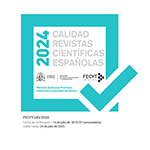(De)institutionalisation within the framework of the UN Convention on the Rights of Persons with Disabilities
Abstract
The international Convention on the Rights of Persons with Disabilities offers a (new) social and legal tool for interpreting disability. The ratification of the Convention by the Spanish state requires systemic changes across a range of different public policies. From this perspective, we conduct a reflective analysis on the institutionalisation of persons with disabilities in centres regulated within the framework of Law 39/2006, on the promotion of personal autonomy and care for persons in situations of dependence. Making use of the discourse of the social model of disability, which arises from the Convention, we seek to demonstrate how disability is represented as a “problem” and (de)institutionalisation is justified. We conclude by noting the need and obligation to transition from institutionalised care in specialist centres to support in community environments.
Downloads
Article download
License
In order to support the global exchange of knowledge, the journal Cuadernos de Trabajo Social is allowing unrestricted access to its content as from its publication in this electronic edition, and as such it is an open-access journal. The originals published in this journal are the property of the Complutense University of Madrid and any reproduction thereof in full or in part must cite the source. All content is distributed under a Creative Commons Attribution 4.0 use and distribution licence (CC BY 4.0). This circumstance must be expressly stated in these terms where necessary. You can view the summary and the complete legal text of the licence.









